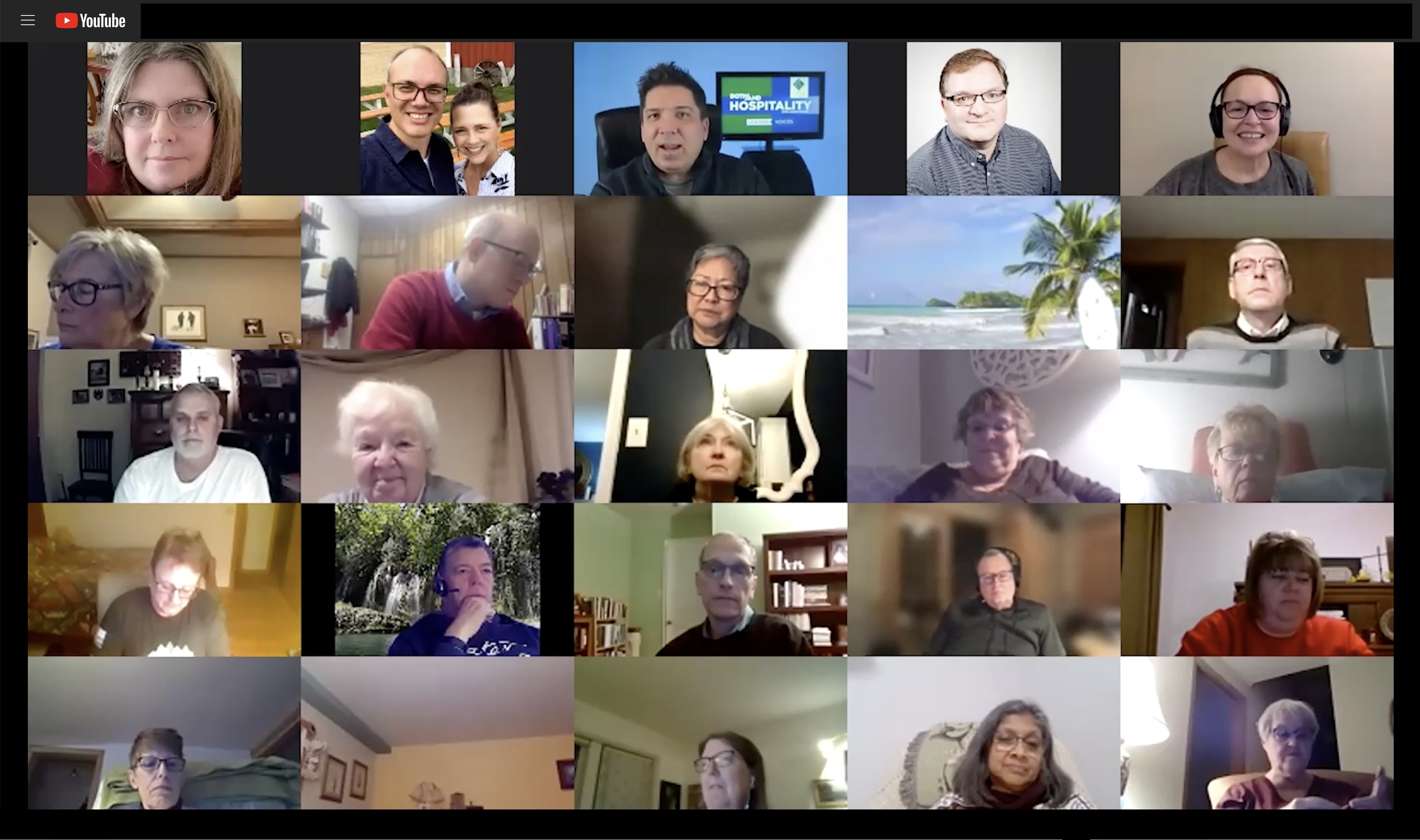
Four ways to BOTH / AND hospitality

Hospitality is key to making people feel welcome in God’s kingdom. In this post-pandemic era, churches find themselves offering ministry opportunities both in-person and online.
“Be relational and not just transactional,” says Jason Moore in the BOTH/AND Hospitality webinar, hosted by the Bishop Ough Innovation Center at United Seminary. Guest hospitality for churches is about creating a welcoming culture for guests that come to church online or in-person.
Moore said, “What would it look like to do hospitality for the church the way the airlines do hospitality? When you think about your first flight. You listened intently to all the instructions. The messages were very valuable to us as first-time flyers. When you go to a church for the first time, you seek helpful information and cues, whether you are worshipping online or in person.”
Here are four ways Moore suggests making people feel welcome online and in-person:
- Make a great first impression—the digital and physical door. The website is the church’s front door. It was the only door for people to enter the church during the pandemic. “Now more than ever, people are paying attention to what churches put online,” said Moore.
- These are some best practices for your church’s website.
- Ensure that you have the worship times prominent and near the top of the page. Have a description of the worship service and what the visitor will experience. Define terms like traditional and contemporary worship. Be specific about music, liturgy style, and what visitors should expect.

- Share the location both online and in person. Make them visible and easy to follow. Make sure the links to the site, like watch live here, are active and take you to the right place. The same is true for in-person locations.
- A robust staff section on your website will help build relationships. All staff need to have a photo on the website, and it should be the same style. Contact information helps people get in touch and build relationships. A vision statement for each staff person in ministry helps.
- Websites need to be accurate and up to date.
- The physical front door to your church needs to be about wayfinding. Wayfinding is about information systems that guide people through a physical environment and enhance their understanding and experience of a space. Best practices for wayfinding are:
- Signage needs to be simple.
- Be consistent with style and information on signage—font, colors, and shapes. Put your mission and vision on the wall as a first impression. Create a welcome area that is marked and staffed with people there.
- Be accurate with your signage and communication, especially about worship times.
- Avoid insider language like narthex, parlor, sacristy.
- Signage needs to be intentional. Make sure you can read the sign clearly, and there are no needed repairs. The language on a sign should be positive.
“Visitors are unexpected. You prepare for guests. Plan for guests,” said Moore. “Build your guest readiness.”
2. Demystify the insider secrets by building bridges to the uninitiated. In churches today, we have secret identities, secret code language, and secret handshakes that happen both online and in person.
- Do introductions throughout the worship service. We assume that everyone knows who each person is during worship. Sometimes it is hard to decide who the pastor is, especially if multiple people assist with worship. Identify who people are by name during worship to remove the mystery and create a connection. Online this means putting the name on a lower-thirds or in a graphic.

Jason Moore and Rev. Sue Nilson Kibbey hosted Q&A as part of the webinar.
- Avoid disembodied voices, people you cannot see and hear clearly during worship. Get people to come forward and talk on camera and a microphone.
- Consider having nametags for your hospitality team, so guests know who to approach.
- Make sure your language fits the in-person and online person. For example, bulletins and connect cards are physical opportunities but not digital.
- Make sure you explain rituals or practices related to greeting, attendance, communion for those participating in-person and online.
- Avoid forced interaction give people choices or space for things like passing the peace. Consider people the option to bow out or optionally offer peace.
3. Encourage everyone to participate in the worship experience. We often favor people in the room and forget about those online.
- There are three different distinct groups of people who worship. One group is people who worship in real-time in-person. Some people worship in real-time online. Then there are those that worship online later. It is easy to exclude the online groups.
- Be mindful of the instructions that you give. Comments like” let’s stand together” speak only to those who worship in person. Use an instruction like, “stand with us in body if you are here and in spirit if you are online.” Perhaps use QR codes for prayers to gather prayers from everyone online and in person.
- Avoid using the words “watching worship, viewers, and virtual worship.” Everyone is in the active posture or worship.
4. Build lasting relationships with people. Think of ways you can take people to the next step in discipleship through follow-up opportunities and next steps.
“It is really when you are online and in-person that you honor their time. Honor the time you start and the time you say you'll end,” said Moore. “Cut out any of the peripherals like 10 minutes of announcement slides before worship begins. Make it simple to connect to worship when it starts and ends.”
- These are some best practices for your church’s website.